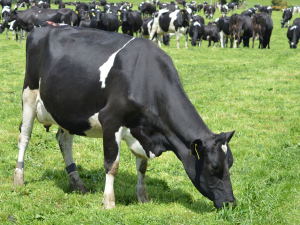DairyNZ says it is hearing of several cases of nitrate poisoning in the Waikato region, with several cow deaths.
Nitrate poisoning is caused by high nitrate levels in feed and usually occurs in late autumn or winter, particularly during a flush of growth after a dry period.
In an email to Waikato farmers, DairyNZ regional leader Waikato Wilma Foster outlined key factors to reduce of nitrate poisoning in herds.
• Test grass for nitrate levels – you can get kits from your local vet clinic. Test each break.
• Feed supplement first before feeding high nitrate feeds – this reduces the eating speed of cows.
• Feed ‘at risk’ pastures/crops in the afternoon on a sunny day – sunshine helps break down the nitrate levels, avoid these paddocks on cloudy days.
• Check the animals 1-2 hours after you put them on a new break.
• Call a veterinarian at the first signs of trouble.











